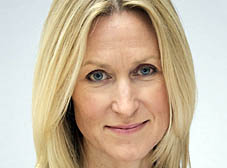|
|
 |
| |

Fiona Millar: ‘working father’ needs to find itself into everyday parlance |
Tips in favour of a work-life balance
Memories of tears shed as a young mother 20 years ago have prompted Fiona Millar to examine the challenges working women face today, writes Dan Carrier
The Secret World of the Working Mother
By Fiona Millar. Vermilion £12.99
SHE locked the door behind her in the vague hope she would not be heard, and sobbed uncontrollably.
Fiona Millar had returned from maternity leave to pursue the job she had always dreamt of – lobby correspondent for a national newspaper.
But the strain of leaving her first-born three-month-old child with grandparents and a nanny took the sheen off her work. She found herself in floods of tears in a Houses of Parliament toilet cubicle as she listened to her young son crying back at her down the other end of a phone.
Remembering the hard choices facing her when she first became a mother provides a base for her new book which consists of a series of interviews with mothers to reveal which way the work/home balance tips in Britain in 2009.
“It is 20 years since I took the plunge and went back to work as a full-time political reporter, leaving a baby with a young nanny,” she recalls. “I can’t remember much I enjoyed about the subsequent nine months. I had got pregnant unexpectedly after taking on a job as a lobby correspondent and went back to work full of the best intentions to stick with a job that involved long hours and late nights.”
She recalls that her infant son seemed to be perfectly happy – but Fiona wasn’t.
“After nine months of exhaustion and hearing the baby howling at the other end of the phone, I reached a tipping point one evening when I got home to find my son reaching out to his grandfather rather than me,” she remembers. “I decided it was time to give up work.”
She is all too aware of the pressures placed on mothers, which is often not helped by the attitude of their other halves. She reveals that her partner, Tony Blair’s former press secretary Alastair Campbell with whom she lives in Gospel Oak, does little on the domestic front. It is another strata of the demands she has had to juggle: her career has included working as an aide at Downing Street and as an education commentator.
She has been a governor at Gospel Oak primary school and involved in the Campaign for State Education. It seems hardly surprising that she admits one of the only bits of “me time” she had as the children were growing up was when she went for an early morning swim at the Parliament Hill Lido.
Having drawn up a picture of the ways women balance their commitments to raising their family and their work, she wants it to read like a call to arms to defend the rights and needs of the working mother.
She would later return to work, smoothed by the willingness of her employers at the Daily Express to let her work flexibly. It continued for the next 20 years.
“Throughout it all I have had crashes of confidence, been permanently exhausted and moderated every career choice with the anxiety that I would let my children down in some way,” she says.
“I have had pangs of regret seeing contemporaries reach the top, either because they have chosen not to have a family, or because they managed that delicate emotional balance between work and family better than I did. I am conscious that I have on occasions traded professional fulfilment against the competing desire to be a good parent. I have raged against the unfairness of it all but probably wouldn’t have had it any other way.”
But the overriding message is: men simply need to do more. They have to face up to the fact that being a parent means splitting the chores and responsibilities 50-50, and that the term “working father” as opposed to “working mother” needs to find its way into everyday parlance. This will in turn lead to greater equality in the workplace as the pressures of home and work life are shared.
“Almost 40 per cent of women with dependent children work part-time, compared to 4 per cent of men with the same family responsibilities,” she says. “Women still do on average three-quarters of domestic ‘housework’ hours and the increase in women’s paid work has not been matched by an equivalent increase in men’s unpaid work in the home.”
Sounds as if it’s long past the time for Alastair to roll up the sleeves, don the rubber gloves and got stuck into the housework. |
|
|
 |
 |
|
 |
|


